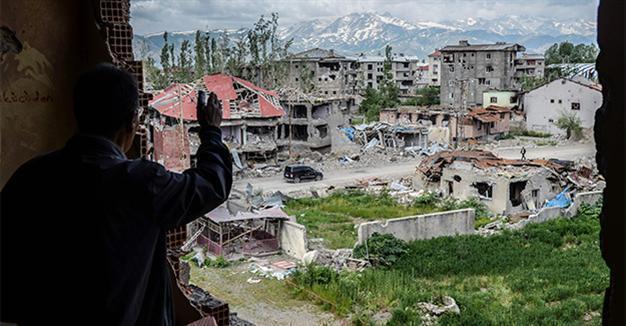Rights violations, terror ops threaten Turkey’s democratic institutions: PACE
STRASBOURG

AFP photo
A number of developments within the Turkish political landscape, including increased restrictions on liberties, the media and the judiciary, in addition to rising violence amid anti-terror operations, constitute a threat to the country’s democratic institutions, the Parliamentary Assembly of the Council of Europe (PACE) has warned in a freshly-adopted resolution.
Tightened restrictions on freedom of the media and freedom of expression, erosion of the rule of law and increasing human rights violations in the face of operations against the outlawed Kurdistan Workers’ Party (PKK) “constitute a threat to the functioning of democratic institutions and the country’s [Turkey’s] commitments to its obligations towards the Council of Europe,” the resolution adopted on June 22 said.
A total of 96 delegates voted for the resolution, while 24 voted against and 10 others abstained. Of the 13 Turkish delegates, only two voted in support of the resolution.
In the text, PACE expressed concern over a controversial constitutional amendment to partially lift the immunities of lawmakers, opening the way for the trial of 152 legislators, mostly from the Kurdish problem-focused Peoples’ Democratic Party (HDP).
“Even though MPs from all political groups are concerned, the assembly notes with concern that this decision disproportionately affects the opposition parties, in particular the Peoples’ Democratic Party, many of whose members have been charged for their statements under the Anti-Terror Law,” the resolution said, urging the ruling Justice and Development Party (AKP) government to revise its law on terrorism “in line with European standards.”
The resolution adopted a strict tone against all acts of terror, specifically naming the PKK, the Islamic State of Iraq and the Levant (ISIL) and the outlawed Kurdistan Freedom Hawks (TAK) – which Turkey recognizes as an offshoot of the PKK.
“The assembly unequivocally condemns these attacks and all terrorist action and violence perpetrated by the PKK, Daesh [ISIL] or any other organization, which can on no account be tolerated,” it said, while also calling on the PKK to lay down its arms and end its terror attacks.
On the other hand, the parliament urged Turkey to find a balance between security and individual liberties, stressing that all security operations “must be carried out in line with international law and in accordance with the principle of proportionality and necessity.”
In this regard, the resolution provided figures on rights violations amid round-the-clock, indefinite curfews and criticized the urgent expropriation decision in the historic Sur district of southeastern Diyarbakır province, which sustained serious damage during anti-terror operations.
The resolution also pointed a finger at Turkey’s largest graft probe on Dec. 17 and Dec. 25, 2013, which allegedly involved four former ministers, EU Minister Egemen Bağış, Economy Minister Zafer Çağlayan, Interior Minister Muammer Güler and Urban Planning Minister Erdoğan Bayraktar. The cases were dropped after a massive reshuffling in the state civil service targeting prosecutors and judges linked to the investigation.
The corruption cases “marked the beginning of changes in domestic political processes, in particular the adoption of restrictive legislation and enhanced control of the executive over the judiciary,” it said.
PACE also criticized increasing restrictions on media and the changes in media ownership, in addition to “disproportionate measures” taken to prevent access to social media or websites.
The assembly said it would monitor the developments in Turkey “closely” through its Monitoring Committee and assess the situation after the submission of another monitoring report in 2017.
